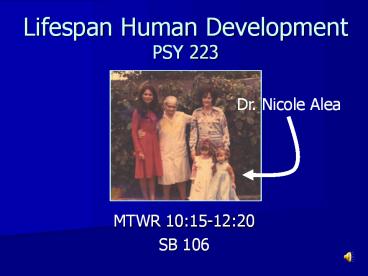Lifespan Human Development PSY 223 - PowerPoint PPT Presentation
Title:
Lifespan Human Development PSY 223
Description:
A field of study that aims to understand constancy & change in physical, ... Human intelligence is determined almost exclusively by genetic factors. OR ... – PowerPoint PPT presentation
Number of Views:173
Avg rating:3.0/5.0
Title: Lifespan Human Development PSY 223
1
Lifespan Human Development PSY 223
- MTWR 1015-1220
- SB 106
2
Syllabus Course Materials
- available online at
- http//people.uncw.edu/alean/PSY223.htm
3
Lifespan human development
- A field of study that aims to understand
constancy change in physical, cognitive,
social, emotional factors throughout the
lifespan.
4
What do you think?
- Development is continuous, gradual progression,
with new abilities, skills, knowledge gradually
added at a relatively uniform pace. - OR
- Development occurs at different rates,
alternating between periods of little change and
periods of abrupt, rapid change.
5
Basic issues
- Continuous or discontinuous development?
Qualitative new skills emerge at particular
periods
Quantitative - adding on more or more complex
skills
6
What do you think?
- Humans everywhere follow the same general
sequence of development. - OR
- Each human passes through a unique course of
development.
7
Basic issues
- One course of development or many?
- Universal basic process for everyone
differences are simply variations in basic
process - Context-specific - unique process for everyone
differences result from different environments
8
What do you think?
- Human intelligence is determined almost
exclusively by genetic factors. - OR
- Human intelligence is largely the result of
experiential factors.
9
Basic issues
- Nature or Nurture?
- Nature human development is biologically
(genetically) determined - Nurture - the physical and social environment
influence human development - Contemporary developmental psychologists say
both
10
When do humans stop developing?
- Traditional population pyramid more children
young
- Projected population pyramid equal young old
11
Lifespan Perspective Paul Baltes (1987)
Max Planck Institute for Human Development http//
www.mpib-berlin.mpg.de/
Table 1.5 Major Theories of Human Development
12
Development as lifelong (Table 1.1)
Period Approximate age range
13
What abilities increase with age?
What abilities decline with age?
14
Multidirectional multidimensional
- Multidirectionality decline growth at all
points in lifespan - development doesnt occur in one direction
- ratio shifts with age
15
ratio between gains losses shifts across
lifespan
16
Multidirectional multidimensional
- Multidirectionality decline growth at all
points in lifespan - development doesnt occur in one direction
- ratio shifts with age
- Multidimensionality pattern of decline growth
varies across within domains
17
gains losses depend on domain
Emotional understanding
Vocabulary
Memory
Ability to learn foreign language
18
Plasticity
- Humans have a range of functioning
- Natural occurring plasticity through compensation
- Plasticity through training
- Less plasticity with increasing age
19
Embedded in multiple contexts
- Age-graded influences
- related to chronological age
- History-graded influences
- related to generational (cohort) events
- Nonnormative influences
- related to unique experiences
20
(No Transcript)
21
Research Methods
22
Developmental psychology in the news
23
Playing violent video games, like Grand Theft
Auto, leads to increased aggression in
adolescents.
24
General Research Designs
- Correlational design see how two (or more)
pre-existing variables are related
variables move in same direction -
variables move in opposite direction
.46
-.09
Ranges 0 to 1 Closer to 1 stronger the relation
25
What conclusions can we make?
- Cannot make cause effect conclusion
directionality problem do not know the direction
of relation
third variable problem other variable might
account for relation
26
Playing violent video games, like Grand Theft
Auto, leads to (i.e., causes) increased
aggression in adolescents.
27
General Research Designs
- Experimental design manipulate variable to test
the effects on outcome variable
Variables
(Aggressive behavior)
28
General Research Designs
- Experimental design manipulate variable to test
the effects on outcome variable
Variables
Group 1 nonviolent game Group 2 violent
game
(Aggressive behavior)
29
How do I know if experiment worked?
30
What conclusions can we make?
- Because have random assignment to IV
- rules out confounds other explanations
- without it, do not have a true experiment
31
Playing violent video games, like Grand Theft
Auto, leads to increased aggression in
adolescents.
32
Developmental Research Designs
Building blocks of ALL developmental research
Variables Measure Effects from
Changes in a person
experiences unique to a generation
circumstances during data collection
33
Developmental Research Designs
- Cross-sectional age cohort vary, time constant
Time
Cohort 2005
1995 10
1990 15
1985 20
Can only conclude age differences
34
Developmental Research Designs
- Longitudinal age time vary, cohort constant
Time Time Time
Cohort 1995 2000 2005
1985 10 15 20
Can conclude age change
35
Advantages Disadvantages
Practical quick
Age differences Cohort effect
Time effects Practice effects Nonrandom drop-out
Lack of generalizability
Measures age change
With all the problems, what should researchers
do?
36
Developmental Research Designs
- Sequential combine cross-sectional
longitudinal designs
Time Time
Cohort 2005 2010
1995 10 15
1990 15 20
1985 20 25
37
- Considered the best developmental research
designbut hardly ever done?
38
In-class Assignment 1
- The purpose of this assignment is to give you an
opportunity to apply and practice - what you have learned about general and
developmental research designs.

